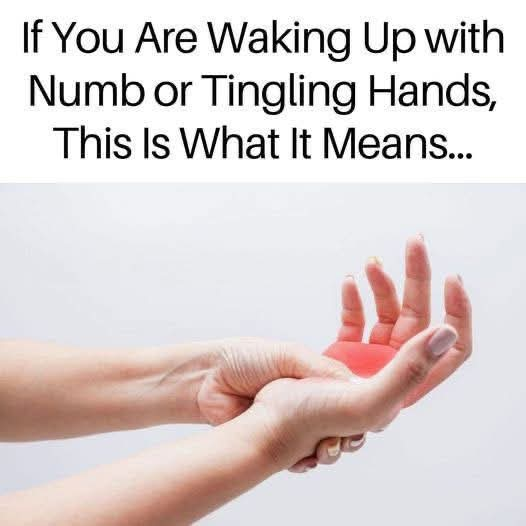If you’re anything like me, you’ll be no stranger to occasionally waking up with a tingling sensation in your arms, hands, or fingers.
You’ll likely know what I’m talking about; when your muscles appear to have gone to sleep and it takes a minute or so before you’ve fully regained any sense of feeling.

But what does this strange sensation actually denote? Referred to by many as “pins and needles”, it can be experienced as numbness, tingling, or even burning in one’s hands, feet, legs, or other body parts.
According to the National Institute of Neurological Disorders and Stroke, it’s proper name is paresthesia, and is characterized not by a feeling of pain, but rather a discomfort that can appear without warning (that is to say not just after you’ve woken up).
If you’ve been sleeping, or indeed remained in the same position for too long a period of time, you’ll have certainly experienced the “pins and needles” I mentioned earlier. This is actually called transient paresthesia, and mostly occurs as a result of sustained pressure being exerted on a nerve.
That said, it can also be caused by other conditions, including a nerve injury or herniated disc, amongst other things.
How to make the tingling go away
It’s hardly a surprise that the majority of people aren’t too keen on experiencing paresthesia. Though, as stated, it’s not commonly associated with any great amount of pain, it is uncomfortable, and sensitivity is often higher in the affected limb.
To restore normalcy to the limb, one must get blood circulating once more to the affected nerve. Stretching or massaging the limb can help with this, hastening relief.

Can it become chronic?
While most of your brushes with paresthesia will be brief, it can actually develop into a chronic issue as a result of neurological disease or nerve damage, including a stroke, multiple sclerosis, or encephalitis.
Tumors, vascular injuries, or carpal tunnel syndrome can also cause chronic paresthesia.
It should go without saying that readers should see a doctor or qualified medical professional if they are concerned. It may be time to seek help if your paresthesia:
- Begins suddenly
- It follows a recent head injury
- Involves an entire arm or leg
- You experience weakness or paralysis
- You experience confusion
- You experience difficulty talking
- You experience dizziness
- You have a sudden, severe headache
- You have had a head injury
- Your doctor suspects or needs to rule out a brain tumor or stroke
- It begins or worsens gradually
- It affects both sides of the body
- It comes and goes
- It seems related to certain activities, particularly repetitive motions
- It affects only a part of a limb, such as your toes or fingers
Have you ever experienced paresthesia? Let us know in the comments.



